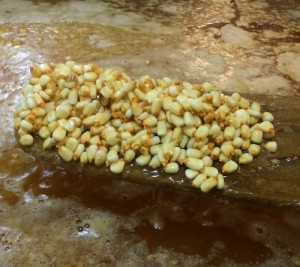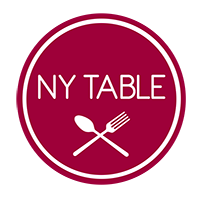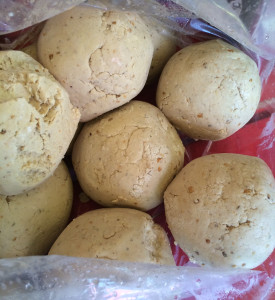For Local Residents, A Home Away From Home
By U-Jin Lee
A large, metal tortilla machine sits right against the front window of Tortilleria Nixtamal, and inside, a sweet aroma of corn fills the air. Mariachi music plays quietly in the background as the patterned flags on the ceiling of the restaurant dance away. Mexican sculptures and Aztec paintings fill the bright red walls. From a small walk-up window, the store manager hands a customer a plastic bag full of fresh-made tortillas. On the other side of the restaurant, families sit around a communal table, sharing enchiladas and soft-shell tacos.
Crouched under a table, a man takes a tile and carefully positions it on the side of the booth.
“We originally started off with two to three picnic tables outside, but now, we’re building tables inside,” said co-owner Shauna Page.

The corn is soaked overnight in a metal basin filled with water and calcium hydroxide. Photo: U-Jin Lee.
The man filling the side of the booth with tiles is the uncle of owner Fernando Ruiz. Since Ruiz and his girlfriend, Page, opened this restaurant back in 2009, Fernando’s uncle, Tio Pancho, who’s worked in the construction business for over 40 years, has designed the interior of Tortilleria Nixtamal and built the tables from scratch.
Tortilleria Nixtamal, tucked inside the heart of Corona, Queens was founded by 40-year-old Ruiz, a native of Puerto Veracruz who moved to Brooklyn when he was three. Since then, he has been visiting Mexico every year, to reunite with his family and relatives. Page, his girlfriend, is a 35-year-old California native who was a financial analyst before they met. Known as the only place in the city that makes fresh masa dough from corn seeds, the restaurant proudly displays its tortilla machine in the front window for passersby to see.
“People think it’s crazy that we put our tortilla machines in front of the window because it’s like putting our kitchen out for everyone to see,” Page said. “But this is how it’s done in Mexico and we have nothing to hide about how we make our food. That’s how it should be.”
The couple originally started the tortilleria as a wholesale business, but those plans quickly changed as the clientele grew, and the business expanded its menu from freshly-made tortillas to serving a variety of platters ranging from tamales verde and pork in tomatillo sauce to tacos nopales, soft-shelled tacos filled with grilled cactus, tomato, and melted Oaxaca cheese. The shop now delivers to over 50 Mexican restaurants, food trucks, bodegas, cafés and hotels in the five boroughs. In the past year, it has also opened up a catering service for parties and personal events, as well as a kiosk off of the Brooklyn Bridge—a small, takeout booth that serves tamales and tacos.
Over the past decade, Tortilleria Nixtamal has seen an increase in Mexican customers, due to a growing Mexican population in Corona, which is replacing the African-American and Italian-American populations. Seventy percent of Corona’s residents are now Hispanic, while a decade ago, only 25 percent of the population was Hispanic.
When the storefront first opened five years ago, Tortilleria Nixtamal was popular among many Italian-American and out-of-state customers, but now, almost half of the clients are Mexican, Page said. “Just down the street, you see more people moving in from Mexico, Dominican Republic, and Ecuador.”
Ruiz and Page are finding ways to keep up with the demand. “We’re at that stage where we stay a family-owned business or expand as a franchise,” Page said. “But expanding is going to be a challenge because it’s going to be hard to duplicate this experience.” Before the couple decides to expand, they want to figure out ways to preserve its foundations.
Ruiz said that he wanted to bring the taste and feel of Mexico to Queens. When he was young, in Puerto Veracruz, he would stop on the street to eat tacos made at the tortillas machines, where he could hear and see how the tortillas were made. In order to recreate this experience, Ruiz directly imports the kernels from a family-owned farm in Chicago, Illinois and makes the corn dough from scratch.
“We don’t use any preservatives, lard, or salt and our tortillas have a shelf life of a week—it’s 100 percent all-natural,” Ruiz said. In a city where it’s easy to find stacks of flour tortillas sitting on local shelves for several weeks, Tortilleria Nixtamal is unconventional.
The restaurant even allows customers to go downstairs, to take a look at how the corn dough, or masa, is made.
Santiago Barragan, a Mexican native from the city of Puebla, has been a chef at Nixtamal for over three years. Previously, Barragan was a cook at a small Mexican restaurant in Soho, in Manhattan, but he said that working at Nixtamal is different mainly because of the way the staff treat each other. “There’s nine of us here working in the restaurant, and we all treat each other like family,” he said.
Downstairs, corn seeds soak in water and calcium hydroxide overnight, in a giant metal tub. As Barragan lifts the seeds up with a wooden stirring rod, he says, “the corn turns into a light yellow color and it becomes soft.” Next, the corn goes through a long pipe where the water rinses the skin off the corn, and then into a grinder, where limestone grinds the corn into corn dough, or masa. The masa is taken upstairs and rides a conveyor belt through the machine in the window, where it’s cut into circles and flame-cooked. The soft tortilla is immediately served with a choice of fresh vegetables, seafood, or beef.
Danny Loi, 35, is a regular customer at Tortilleria Nixtamal. “I come here all the time because the tortillas here are pillow soft,” he said. He used to buy flour tortillas from food trucks on the streets, but Loi said that they are dry and hard compared to the corn tortillas from Tortilleria Nixtamal.
In order to recreate the authentic experience, Ruiz and Page bought the tortilla machine in Mexico and had it shipped to the store. Ruiz then asked a chef from Veracruz to come to Nixtamal and teach them the production of tortillas. Their business plan also includes helping educate New Yorkers about the healthy side of Mexican cuisine.
“Mexican food has a bad reputation—you think that the taco shells are deep-fried or that the burritos are filled with cheese and beef—but it’s not all like that, so we have a social responsibility to give people the healthy choices,” Page said.
As Ruiz’s uncle gets up from placing the last few tiles on the bottom corner wall of the side booth, he grabs a hammer and a wooden post that has ‘Tortilleria Nixtamal’ scratched inside it. Each of the tiny tiles has a yellow, painted face of a sun in front of a dark blue background—a mosaic of the Aztec culture.
Tags: corn, non-GMO, Queens, tortilla, tortilleria

Your Comments